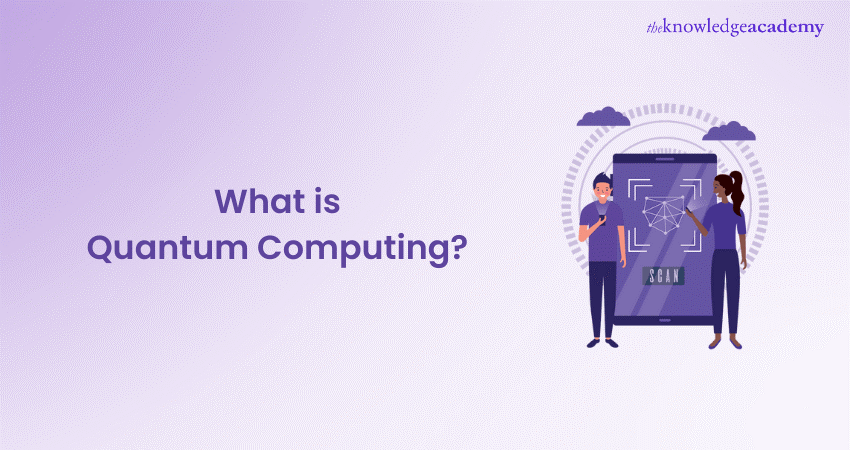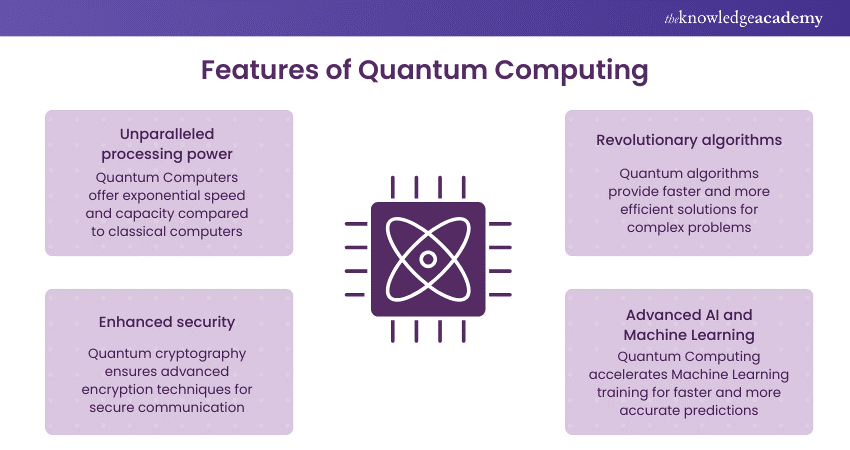We may not have the course you’re looking for. If you enquire or give us a call on +41 315281584 and speak to our training experts, we may still be able to help with your training requirements.
Training Outcomes Within Your Budget!
We ensure quality, budget-alignment, and timely delivery by our expert instructors.

Are you a Science, Technology, Engineering or Mathematics (STEM) student, researcher or professional? Perhaps you are curious about the cutting-edge developments in the field of computing and want to explore something similar. Or maybe you are just an avid learner and want to understand a new paradigm for solving complex problems. Then Quantum Computing is just for you. You might ask, ‘What is Quantum Computing?’ and why should you care about it?
This blog will answer all your questions about Quantum Computing and much more. In this blog, we will cover "What is Quantum Computing?" its history and principles while also explaining its challenges and limitations. We will also give you a closer look at some of the current and future applications of Quantum Computing.
Table of Contents
1) What is Quantum Computing?
2) What are the principles of Quantum Computing?
3) Types of Quantum Technology
4) How can companies use Quantum Computing?
5) Conclusion
What is Quantum Computing?

Quantum Computing is a revolutionary approach to computation that leverages the principles of quantum mechanics. Quantum Computing is like the superhero version of regular computing. Unlike classical computers, which use bits to represent data as either 0 or 1, Quantum Computers use quantum bits or Qubits. Qubits can exist simultaneously in multiple states thanks to Superposition and Entanglement phenomena.
These Qubits allow Quantum Computers to perform complex calculations at unprecedented speeds, potentially solving infeasible problems for classical computers. They're like the secret weapon for cracking codes, finding new drugs, and solving challenging problems faster than regular ones. Quantum Computing holds promise for cryptography, optimisation, drug discovery, and materials science breakthroughs, paving the way for a new computing and technological advancement era.
How does a Quantum Computer work?
Quantum Computers work differently from classical computers by harnessing the principles of quantum mechanics. Qubits are the fundamental information units at the heart of a Quantum Computer. Unlike classical bits, which can be either 0 or 1, Qubits can exist in multiple states simultaneously, a phenomenon known as Superposition. Additionally, Qubits can be entangled, meaning the state of one qubit depends on the state of another, regardless of the distance between them.
Quantum Computers use quantum gates to manipulate and process Qubits, similar to classical computers' logic gates to manipulate bits. These gates perform operations on Qubits, exploiting their quantum properties to perform computations. Quantum algorithms, such as Shor's and Grover's algorithms, leverage these unique properties to solve certain problems much faster than classical algorithms.
However, maintaining Qubits' delicate quantum state is challenging due to decoherence, which can disrupt quantum information. Therefore, Quantum Computers require specialised techniques, such as error correction and quantum error correction codes, to mitigate decoherence and ensure reliable computation.
What are the principles of Quantum Computing?
Quantum Computing operates on fundamental principles of quantum mechanics, offering unique capabilities compared to classical computing. These principles include Superposition, Entanglement, and Quantum Interference.
a) Superposition: Unlike classical bits, which can be either 0 or 1, quantum bits or Qubits can exist in multiple states simultaneously. This property allows Quantum Computers to process vast amounts of information in parallel, significantly increasing computational power.
b) Entanglement: Qubits can become entangled, meaning the state of one qubit depends on the state of another, regardless of the distance between them. Entanglement enables Quantum Computers to perform highly correlated operations, facilitating efficient communication and computation.
c) Quantum Interference: Quantum Interference occurs when the probability amplitudes of different quantum states interfere constructively or destructively. Quantum Computers exploit interference phenomena to amplify desirable outcomes and suppress undesirable ones, leading to more efficient and accurate computation.
Embark on your Quantum Computing journey and unlock the future of technology with our comprehensive Quantum Computing Training!
Types of Quantum Technology
Quantum Technology encompasses various approaches to harnessing the principles of quantum mechanics for practical applications. Here are the types of Quantum Technology:
1) Gate-based ion trap processors
These systems use ions (charged atoms) held in place by electromagnetic fields as Qubits. Quantum information is manipulated through the application of laser pulses and microwave fields. Ion trap processors offer long coherence times and high-fidelity operations, making them promising candidates for quantum computation and quantum simulation tasks.
2) Gate-based superconducting processors
Superconducting Qubits are fabricated from superconducting materials and manipulated using microwave pulses. They are scalable and relatively easy to control, making them one of the leading platforms for Quantum Computing research. However, superconducting Qubits are susceptible to noise and decoherence, posing challenges for achieving fault-tolerant quantum computation.
3) Photonic processors
Photonic Qubits are encoded in photons, the fundamental particles of light. These processors manipulate Qubits using optical elements such as beam splitters and phase shifters. Photonic processors offer low decoherence rates and compatibility with long-distance quantum communication. They are particularly suitable for tasks involving quantum communication and quantum cryptography.
4) Neutral atom processors
Neutral atom Qubits are atoms with balanced numbers of protons and electrons, manipulated using laser beams. They offer long coherence times and high-fidelity operations, similar to ion trap processors. Neutral atom processors have potential applications in quantum simulation and quantum metrology tasks.
5) Rydberg atom processors
Rydberg atoms are highly excited atoms with electrons in high-energy states, manipulated using laser fields. These processors offer strong interactions between Qubits, enabling the implementation of entangling gates with high fidelity. Rydberg atom processors are being explored for quantum simulation and quantum communication tasks.
6) Quantum annealers
Quantum annealers are specialised quantum processors designed to solve optimisation problems. They exploit quantum annealing, a quantum optimisation technique inspired by simulated annealing in classical computing. Quantum annealers are particularly effective for solving combinatorial optimisation problems, such as finding the optimal configuration of a complex system.
Unleash your potential and stay ahead in the rapidly evolving world of technology with our Advanced Technologies Courses!
How can companies use Quantum Computing?
Quantum Computers possess four key capabilities that distinguish them from classical computers and can be useful for businesses in the coming years:
Quantum simulation
Quantum Computers excel at modelling complex molecules, offering potential chemical and pharmaceutical research benefits. Quantum Computers could expedite drug development processes by accurately simulating molecular interactions, leading to faster discoveries and transformative medical breakthroughs.
Optimisation and search
Quantum Computing enables rapid optimisation across various industries. Unlike classical computers, which perform sequential calculations, Quantum Computers can simultaneously explore multiple variables, efficiently narrowing down the range of possible solutions. This capability streamlines decision-making processes, enhancing efficiency and value creation.
Quantum AI
Quantum Computers hold promise for revolutionising Machine Learning Algorithms. Their ability to handle complex calculations with numerous variables simultaneously accelerates the training of Artificial Intelligence (AI) systems. Applications range from pharmaceutical research to automotive technology, with the potential to advance fields like self-driving vehicles.
Prime factorisation
Quantum Computers can solve complex prime factorisation problems, which is crucial for encryption in cybersecurity. While classical computers struggle with large prime numbers, quantum algorithms like Shor's algorithm have the potential to solve these challenges efficiently. As Quantum Computing advances, new encryption technologies will be necessary to secure online services, driving the development of quantum cryptography.
Conclusion
In conclusion, Quantum Computing represents a paradigm shift in computational capabilities. Understanding the meaning of Quantum Computing unveils its potential to revolutionise industries, from drug discovery to cryptography. As we delve deeper into “What is Quantum Computing?” its transformative impact on technology and innovation becomes increasingly evident.
Unlock the potential of 5G technology with our comprehensive 5G Wireless Training. Register today!
Frequently Asked Questions

Quantum Computing leverages quantum mechanics and qubits to perform calculations simultaneously, offering exponential speedup for certain tasks. In contrast, classical computing uses classical bits and relies on sequential processing, limiting its computational power compared to Quantum Computing.

Some challenges and limitations of Quantum Computing include maintaining qubit coherence, error correction, scalability, and the need for extremely low temperatures. Additionally, quantum algorithms and hardware must overcome practical challenges to achieve reliable and practical quantum computation.

The Knowledge Academy takes global learning to new heights, offering over 30,000 online courses across 490+ locations in 220 countries. This expansive reach ensures accessibility and convenience for learners worldwide.
Alongside our diverse Online Course Catalogue, encompassing 17 major categories, we go the extra mile by providing a plethora of free educational Online Resources like News updates, Blogs, videos, webinars, and interview questions. Tailoring learning experiences further, professionals can maximise value with customisable Course Bundles of TKA.

The Knowledge Academy’s Knowledge Pass, a prepaid voucher, adds another layer of flexibility, allowing course bookings over a 12-month period. Join us on a journey where education knows no bounds.

The Knowledge Academy offers various Advanced Technologies courses, including Quantum Computing Training and 5G Wireless Training. These courses cater to different skill levels, providing comprehensive insights into Latest Technology Trends.
Our Advanced Technologies blogs cover a range of topics related to Quantum Computing, offering valuable resources, best practices, and industry insights. Whether you are a beginner or looking to advance your Quantum Computing skills, The Knowledge Academy's diverse courses and informative blogs have you covered.
Upcoming Advanced Technology Resources Batches & Dates
Date
 5G Wireless Training
5G Wireless Training
Thu 23rd Jan 2025
Thu 20th Mar 2025
Thu 22nd May 2025
Thu 17th Jul 2025
Thu 18th Sep 2025
Thu 20th Nov 2025







 Top Rated Course
Top Rated Course



 If you wish to make any changes to your course, please
If you wish to make any changes to your course, please


